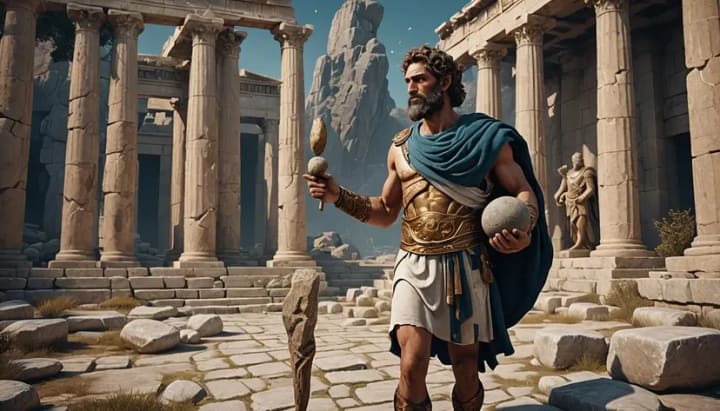10 Fascinating Facts You Didn’t Know About Ancient Greece
The Intriguing Daily Life, Myths, and Surprising Habits of the Great Greek Civilization

You may know the basics, about Socrates, Pericles, theater, and sciences. Your knowledge may go further and include myths about ancient gods and heroes.
But, how many details do you know about the Ancient Greeks’ everyday life?
Here is a list of interesting facts you probably didn’t know about the great civilization of the past.

Ancient Greeks Used to Add Water to Their Wine
Wine was at the core of Ancient Greek culture. There was even a god of wine in the Pantheon, god Dionysus.
However, it was considered hubris for mortals to get drunk; a habit suited only to barbarians.
It was believed that only the god Dionysus could drink wine without water and not get drunk.
If the mortal men did not water their wine, there was a danger of them becoming violent and losing their minds (reminds you of those Saturday nights when you were younger, doesn’t it?).
So what did they do?
They were adding water to their wine!
This way, they could drink a lot of wine without getting drunk…
(or at least that was the idea)
During winter, they would put snow in their cups to save water.
The usual ration would be half wine and half water.

There was Only One Mother for All Ancient Greek Monsters
Most of the famous monsters from Greek Mythology had the same mother!
Echidna, the mother of Monsters, was half-woman and half-snake.
Echidna and her mate Typhon, a monstrous serpentine giant, tried to overthrow Zeus for the supremacy of the world.
Zeus, with the aid of his thunderbolts, managed to defeat them and punished Typhon by burying him underneath Mount Etna.
Echidna and her descendants lived to challenge many future Heroes.
Some of her descendants were:
- Cerberus, the three-headed dog of Hades, guardian of the Underworld
- Lernaean Hydra, the serpentine water monster that was killed by Hercules
- Chimera, the fire-breathing hybrid creature; the treacherous Sphinx that would kill anyone that would answer wrongly to her riddle
- Scylla, the legendary monster that killed many of Odysseus’ crew during his adventures in Homer’s Odyssey.

Ancient Greeks Used Stones for Toilet Paper
It may come as a surprise to many, but there was no toilet paper in classical Greece!
The list of things people from different world cultures would use before the invention of toilet paper is endless.
It includes tree leaves, corn, coconut shells, sheep’s wool and sails (for those who could afford it), sponges tied to rods or plain water.
But, arguably, it is the Ancient Greeks who make the difference!
For particular hygiene purposes, they used stones, pebbles, or ceramic pieces.
Useful information to remember if you ever camp in the woods or at a beach and you run out of paper…

Ancient Greeks Could Have Been Partially Colorblind
Homer, in his famous works Iliad and Odyssey, describes the Mediterranean Sea as a “wine-dark” sea.
Have you ever looked at the sea and thought that it was the color of claret?
Homer, actually, names only a few color terms and uses the same colors to describe objects that look quite different.
According to Mark Bradley, Associate Professor of Ancient History at the University of Nottingham, color operated in a very different way in antiquity from what we are used to today.
According to him, the Greeks viewed color as essentially the visible outermost shell of an object.
So the fire wouldn’t be red, it was fire-colored.
The dirt would be dirt-colored.
The sky would be sky-colored, and the skin would be skin-colored.
“They wouldn’t talk in terms of the abstract colors that we are used to today.”

Ancient Greeks Counted Time in Two Ways
Ancient Greeks had two different conceptions of time, using two different words: Chronos and Kairos.
The former refers to time as we know and measure it today, the chronological time.
The latter signifies a proper or opportune time for action.
In other words, the right time to do something.
In contrast to Chronos, which is quantitative, Kairos was qualitative in nature…
Ancient Pythagoreans thought Kairos to be one of the most fundamental laws of the universe.
In Aristotle’s scheme of rhetoric, Kairos plays a very important role.
For him, Kairos is the time and space context in which the proof will be delivered.

Ancient Greek Men Used Their Hair to Declare Their Status-quo
Beard was a symbol of prestige for a man.
Their grooming was of the utmost importance but also a subject of competition between men, which made the good hairdressers very sought after.
Ancient Greeks, in fact, considered the beard a symbol of manhood and wisdom.
The Spartans punished the cowards by shaving part of their beards.
The hair was considered by them to be the most valuable part that the human body could produce; they believed that the hair gave power to the dead for their journey to the Underworld.
On the other hand, losing hair for Ancient Greeks was not a negative thing.
On the contrary, it was an indication of their wisdom.
This is the reason most statues depicting philosophers are bald.
Fun fact!
When you visit Greece you will surely notice that the vast majority of modern Greek men have a beard, a habit that still survives, thousands of years later.

Ancient Greek Women were Adorning Themselves Much Like Today
Women in Ancient Greece paid a lot of attention to their appearance.
They dyed their hair blonde and added curls using a hot iron.
They plucked their eyebrows with tweezers, painted their faces white with lead carbonate and accentuated their features — particularly the eyes — using mineral and plant dyes.
Bronze mirrors, combs made of ivory, small bottles of perfume (alabastra) and boxes for jewelry and cosmetics (pyxides) completed the range of women’s accessories.
“Waxing” was also a regular thing for them.
They used razors made from flints, tweezers, creams, and stones.

Ancient Greeks were Very Superstitious
Ancient Greeks were very wise, but they were also very superstitious.
Superstitions played a big part in their everyday life.
Some days of each month were considered ominous, so they would avoid important tasks such as sowing or marriage.
They would also take measures before doing certain tasks so that they would not anger the gods.
For example, praying first before crossing a river.
However, there is one superstition that survives to this day in Greece!
The so-called ‘evil eye.’
It is still believed by Greeks that someone can cast the evil eye to someone else out of envy (good or bad) and jealousy.
The symptoms of having the evil eye is dizziness, strong headache, and yawning.
The good news is that the ‘spell’ can be broken by someone who knows how to perform the special counter ritual.
Fun fact!
The evil eye is a superstition that still survives not limited to Greece today.
Most cars will have an amulet of an ‘eye’ hanging from the rear mirror, to protect those inside the car.
Many Greeks wear a bracelet with an ‘eye’.

Ancient Greeks Used Sexual Performance Aids
Honey and pepper was the ultimate ancient Viagra!
In antiquity there was a number of preparations designed to improve men’s sexual performance.
Some of them enabled them to have permanent stimulation.
Honey in combination with pepper was one of the most common and effective formulations.
The man would put the mixture on his penis and rub it with it.
Better than Viagra?
Definitely cheaper!

Ancient Greeks had Pregnancy Tests As Well
Pregnancy tests are not a devising of modern times.
Ancient Greeks had a rather unusual method for detecting if a woman was pregnant.
They would insert a clove of garlic inside the woman’s vagina overnight.
If she was not pregnant, her breath would smell of onions the next morning.
The idea behind this test was that, if there was no child, the woman’s tomb would be ‘unobstructed’ and the smell would travel up to her mouth.
However, we guessthat this test must have not been very reliable…
Another test, nevertheless, comes from the great physician Hippocrates who believed that the administration of honey with water could have reliable results.
The woman would drink a glass of water with diluted honey before bedtime and the test would be positive if she experienced bloating and cramps during the night.
About the Creator
Enjoyed the story? Support the Creator.
Subscribe for free to receive all their stories in your feed. You could also pledge your support or give them a one-off tip, letting them know you appreciate their work.






Comments (1)
How interesting. Now I think I am going to re-read my Humanities chapters on the Greeks. What about the Romans?